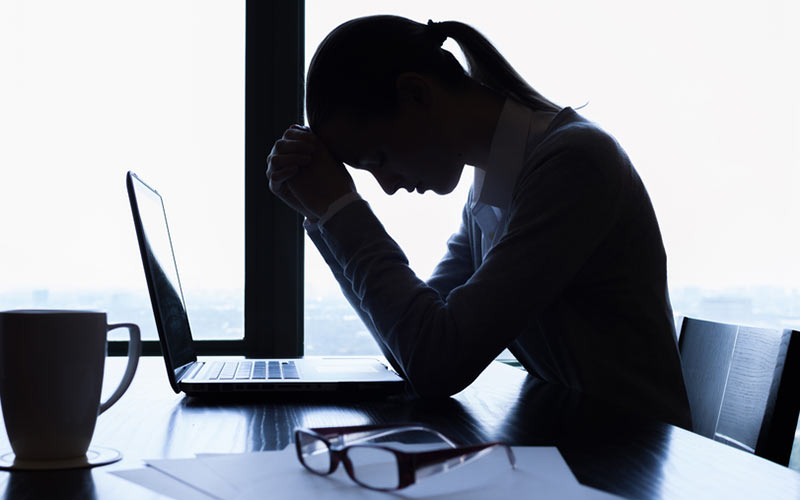The Covid-19 pandemic and the wellbeing of in-house counsel

The Covid-19 pandemic has ushered in an era of unprecedented uncertainty and upheaval, triggering changes in the working lives and wellbeing of almost every adult. In-house counsel in particular have been affected by the swift pace and extent of the changes, as Debbie Thomas explains.
According to Marco Bollini, Chair of the IBA Corporate Counsel Forum, ‘in-house legal departments have been put under [the type of] stress possibly never experienced before.’ He adds that this is ‘particularly true of small-size legal departments that have seen their workloads increase exponentially’ and he believes this may have an impact on the wellbeing of in-house counsel.
By way of explanation, Bollini points to two facets of the Covid-19 pandemic that are unique: its reach and duration. He says that the pandemic ‘affects all aspects of company life and it will last for several months’, adding that it is the combination of these two factors that has had a direct impact on in-house lawyers.
In-house counsel, especially at the beginning of the pandemic, have had to assist in many different practice areas of law, such as employment, contract, company and health and safety. Bollini explains that they were required to provide advice rapidly ‘while, at the same time, many countries were issuing new rules and regulations to govern the new unexpected environment.’
By way of example, in England, the speed of legislative change was illustrated by the Coronavirus Act 2020. The Act, which has a broad sweep of powers, achieved Royal Assent on 25 March and came into force on the same day, having been fast-tracked through parliament in just four sitting days.
In addition to the challenge of having to deliver advice in a rapidly changing legal environment, the pandemic has notably also had an impact on working arrangements. Many believe this has affected the wellbeing of in-house lawyers, too. Bollini points out that some of the challenges for in-house lawyers working from home include losing out on the benefit of discussing directly with their colleagues matters of law relating to Covid-19.
Rolandas Valiunas, Co-Chair of the IBA Law Firm Management Committee and Managing Partner at Ellex Valiunas, takes the argument further. For many in-house counsel, he says, it was a strange, new and difficult reality they had to face and deal with, and that ‘probably, staying at home was the most difficult thing for all of us’.
In-house lawyers have been missing out on the office-based, face-to-face communication and social interaction with colleagues that is part-and-parcel of working alongside colleagues in an office, adds Valiunas. These issues can add fuel to the fire of concern about the uncertainty of what the future holds, and could work negatively against those who may already be dealing with health vulnerabilities, he believes.
According to Georgina Hardcastle, a HR consultant at Rix & Kay, ‘long periods of self-isolation, the continuation of home-working and social distancing from colleagues, friends and family… will undoubtedly have had a further detrimental impact on those employees battling existing conditions, such as anxiety and depression.’
‘In-house legal departments have been put under [the type of] stress possibly never experienced before’
Marco Bollini, Chair of the IBA Corporate Counsel Forum
A further stumbling block with homeworking during the lockdown is the practical arrangements. Valiunas highlights the difficulties of being disciplined about working hours and that for some in-house counsel, the distinction between work life and home life has become blurred because tasks that would have taken a shorter amount of time in the office take longer to complete ‘for one simple reason: little children at home.’
In Valiunas’ view, a lack of visible, direct line management and the absence of mentorship/leadership have helped to cement an understanding that the traditional concept of working hours is no more. What’s more, adds Bollini, the need for in-house counsel to be in contact with colleagues over a 24-hour period has created further challenges by stretching workloads and working hours, particularly in companies with operations in different continents, spanning different time zones.
Marco Monaco Sorge, Co-Chair of the IBA Young Lawyers’ Committee and corporate and finance counsel at Tonucci & Partners, believes there have been ‘lots of difficulties in working remotely, including having to regulate the work of those employees who are working from home’.
He also points out that some of the ongoing non-Covid-19 related issues still remain; namely the threat of termination of a lawyer’s contract, and such issues could, in some cases, be exacerbated by the economic after-effects of the pandemic.
As lockdown restrictions are gradually being eased, further problems are coming to the fore. Sorge believes the issue of large-scale redundancies needs to be tackled sooner rather than later, in case the economy does not recover as fast as is hoped.
And while Valiunas remains upbeat, suggesting that on a practical level, it should not take long for in-house counsel to adapt to the new ‘normal’ in terms of ways of working – based on his experience of his company’s own IT preparedness – he balances this optimism with a note of caution. It is important, he feels, to prepare now and not wait for a second pandemic to strike.
To that end, Valiunas advises that two-way feedback with employees is important because, while ‘everybody is eager to be back to normal life’, the reality is that it ‘will be the new normal’. There will be a need ‘to be even more flexible in the new flexible times’ and gauge the energy and mood of colleagues.
Sorge adds that part of the answer to the effects of the pandemic on staff can come from fine-tuning smart working techniques. ‘The answer lies in regulating office hours in a way that is compatible with companies’ needs and the well-being of workers in general,’ he says.